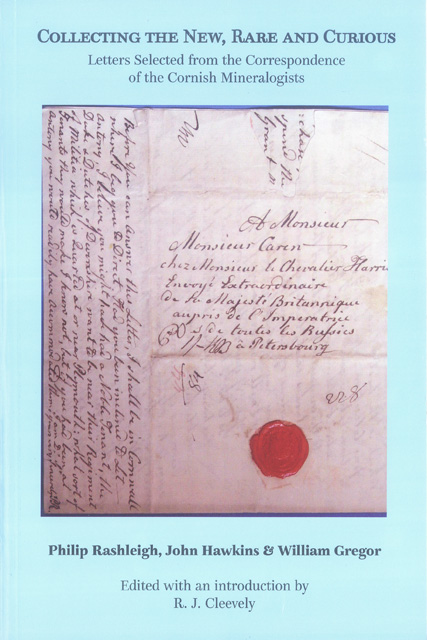 Collecting the New, Rare and Curious
Collecting the New, Rare and Curious Book contents
- Frontmatter
- Contents
- Acknowledgements
- Introduction
- Editor's note
- A note on the published transcriptions
- Chronological list of the correspondence, 1755-1822
- Letters Selected from the Correspondence of Philip Rashleigh,John Hawkins and William Gregor, 17 55-1822
- Bibliography
- Full captions to the colour illustrations
- Name Index
- Subject and Place Index
- The Deuon and Corruaall Record Society
- Frontmatter
- Contents
- Acknowledgements
- Introduction
- Editor's note
- A note on the published transcriptions
- Chronological list of the correspondence, 1755-1822
- Letters Selected from the Correspondence of Philip Rashleigh,John Hawkins and William Gregor, 17 55-1822
- Bibliography
- Full captions to the colour illustrations
- Name Index
- Subject and Place Index
- The Deuon and Corruaall Record Society
Summary
From various sources over the years, the Cornwall Record Office (CRO) has obtained archive material belonging to the Rashleigh and Hawkins families. Several authors have already utilised the rich Hawkins archive. In the 1950s, Sir Arthur Russell acquired a number of letters from the family and used these for his biographical papers on John Hawkins and William Gregor. Subsequently, Francis Steers made various selections related to Sussex (including several to the geologist Gideon Mantell); he also published a catalogue of those then held at the West Sussex Record Office, Chichester and a series of letters relating to the Roman villa at Bignor linked to the work of Samuel and Daniel Lysons and their Magna Britannica. More recently, Professor Lack has listed those relevant to Sibthorp and Hawkins'ioint expedition to the Levant in his authoritative account The Flora Graeca Story (1999). Material from the Rashleigh Archive was used extensively by Russell (1952); Trengove (1972), Embrey and Symes (1987), Jones (1,995), Penhallurick (1,997) and Cooper (1999, 2001, 2006). And I have described elsewhere the contributions made by all three to the development of mineralogy especially through their assistance to continental workers.
The extensive archive of Rashleigh's nephew Reginald Pole Carew (1753-1835), now at Antony House, contains letters written between 1772 until 1808, most of them during the period when Carew travelled throughout Europe, but which somehow he preserved and brought back to England. These letters contain information on family matters, especially Philip Rashleigh's role as guardian to his Carew nephews and niece and the role of his brother Charles in managing their estate. Inevitably Pole Carew's accounts of his iourneys mention political and historical events in Europe. But more significantlR they contain information on the initial growth of Rashleigh's mineral collection, that was largely due to Carew's efforts in negotiating exchanges and purchases with other European collectors in Hungarp Germany and Scandinavia (for example Baron Heynitz (1778/79), Pallas and Engeström (1780/81)), or in notifying Rashleigh of potential sales (e.g Scopoli (1777)). Subsequently, Hawkins initiated exchanges with Baron Trebra, Baron Born and others.e But that with the Austrian collector Jacquin proposed in February 1789, languished until July 1792 and never materialised. Later, an ageing immobile house-bound Rashleigh had to rely on dealers - Mrs Forster, James Sowerby and Henry Heuland - or auctions for additions.
- Type
- Chapter
- Information
- Collecting the New, Rare and CuriousLetters Selected from the Correspondence of the Cornish Mineralogists Philip Rashleigh, John Hawkins and William Gregor, 1755-1822, pp. ix - lxviiPublisher: Boydell & BrewerPrint publication year: 2011
